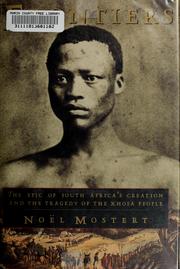Check nearby libraries
Buy this book

"In the 1850s, in despair after sixty years of disastrous wars and British betrayals that had cost them most of their ancestral lands, the Xhosa--South Africa's most important and sophisticated black nation--gave way to a strange and dangerous teaching. Prophets among them declared that salvation lay in killing all their cattle, their most prized possession, and destroying all their food stocks. If they did this, the prophets said, on a certain day everything would be returned to them by supernatural agency and in much greater abundance--huge new herds, copious supplies of grain, and the white man would be expelled from the lands he had stolen." "The herds were slaughtered, the appointed day came, and passed; thousands of Xhosa starved to death." "Yet these cataclysmic events were in fact, as Noel Mostert makes vividly clear in Frontiers, only the cruel climax of a far larger history that had begun hundreds of years before with the slow migration of Xhosa ancestors out of Central Africa toward the Cape, and the coming of the earliest Portuguese explorers in search of a route to India. South Africa, especially the shifting frontiers of the Eastern Cape, was to be the setting for a truly epochal collision between two worlds--white and European, black and African--and it is the story of this confrontation--prolonged, agonized and morally ambiguous--that Mostert tells here."."In its scale and richness, the account is extraordinary, encompassing an immense range of time, places and people, from the initial stunned contacts between shipwrecked sailors and black inhabitants to the imprisonment of the last Xhosa chiefs on barren Robben Island. Here are the first Dutch settlers camping miserably below Table Mountain, beset by weather and hunger and the terrors of the countryside; the wild frontier Boers venturing further and further into the wilderness in search of elephants to shoot and land to graze; the Xhosa and other black peoples learning to mistrust white promises, and the first small-scale wars over stolen cattle or petty insults; the British seizing the Cape as a strategic base, and then finding themselves with an unmanageable--and unwanted--colony on their hands." "We witness the arrival of the missionaries, borne on a tide of goodwill, only to become entangled in politics; the successive colonial governors dispatched from London, veterans almost to a man of the campaigns against Napoleon and confident--at first--in their use of force; and the soldiers themselves, marching uncomfortably in full battle kit (scarlet coat, pipe-clayed straps and all) through the scorching bush. And the story belongs to the Xhosa, to the warriors who continued to fight after repeated defeats, and to the great chiefs, from Ngqika to Sandile, whose grace and patience in the face of what must have seemed inexplicable enmity lend the tale its tragic dimension." "High-minded abolitionist principles, rough imperial ambition, fiercely held indigenous values, the evangelical desire to save souls (even, if need be, at the expense of bodies)--all these converged in the first half of the nineteenth century to complicate and embitter the moral and political drama. As Mostert observes in his epilogue, the end of the wars did not mean the end of the agony, but rather a legacy of pain and anger that to this day shapes South African society."."Based upon years of research, written with a Gibbonesque sweep and a dazzling command of detail, Frontiers is a magnificent and memorable book. It is essential reading for anyone who would understand South Africa today, or the nature of imperialism at its high-water mark, and for everyone who takes pleasure in works of history on an epic scale." BOOK JACKET
Check nearby libraries
Buy this book

Previews available in: English
Subjects
History, Politics and government, Social conditions, Wars, Xhosa (African people), Xhosa (volk), Guerres, Histoire, Geschichte, Xhosa (peuple d'Afrique), Kolonialismus, Grenzkonflikt, Italian Authors, Critics, English Authors, Painters, Italians, Family relationships, Biography, New York Times reviewedPlaces
South Africa, Afrique du Sud, Kapprovinz, XhosaTimes
1836-1909, 19th century, 19e siècleShowing 4 featured editions. View all 4 editions?
| Edition | Availability |
|---|---|
| 1 |
zzzz
|
|
2
Frontiers: the epic of South Africa's creation and the tragedy of the Xhosa people.
1992, Alfred A. Knopf
in English
|
zzzz
|
|
3
Frontiers: the epic of South Africa's creation and the tragedy of the Xhosa people
1992, J. Cape
in English
0224033255 9780224033251
|
zzzz
Libraries near you:
WorldCat
|
|
4
Frontiers: the epic of South Africa's creation and the tragedy of the Xhosa people
1992, Knopf, Distributed by Random House
in English
- 1st American ed.
0679401369 9780679401360
|
aaaa
Libraries near you:
WorldCat
|
Book Details
Published in
New York
Edition Notes
Includes bibliographical references (p. [1321]-1334) and index.
Classifications
The Physical Object
ID Numbers
Links outside Open Library
Community Reviews (0)
Feedback?| August 6, 2021 | Edited by New York Times Bestsellers Bot | Add NYT review links |
| October 11, 2020 | Edited by MARC Bot | import existing book |
| March 2, 2020 | Edited by MARC Bot | remove fake subjects |
| May 8, 2014 | Edited by bob | merge authors |
| December 10, 2009 | Created by WorkBot | add works page |











